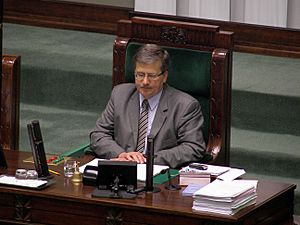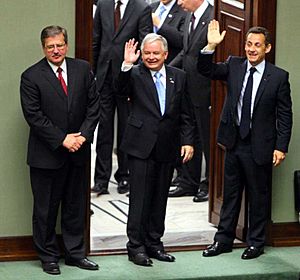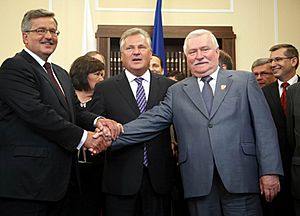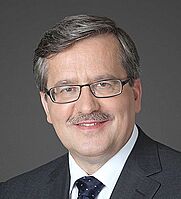Bronisław Komorowski facts for kids
Quick facts for kids
Bronisław Komorowski
|
|
|---|---|
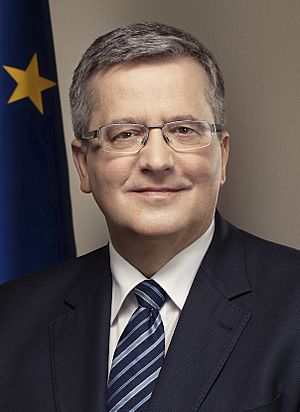
Official portrait, 2013
|
|
| President of Poland | |
| In office 6 August 2010 – 6 August 2015 |
|
| Prime Minister | Donald Tusk Ewa Kopacz |
| Preceded by | Grzegorz Schetyna (acting) |
| Succeeded by | Andrzej Duda |
| Acting 10 April 2010 – 8 July 2010 |
|
| Prime Minister | Donald Tusk |
| Preceded by | Lech Kaczyński |
| Succeeded by | Bogdan Borusewicz (acting) |
| Marshal of the Sejm | |
| In office 5 November 2007 – 8 July 2010 |
|
| Preceded by | Ludwik Dorn |
| Succeeded by | Grzegorz Schetyna |
| Deputy Marshal of the Sejm | |
| In office 25 October 2005 – 4 November 2007 |
|
| Marshal | Marek Jurek Ludwik Dorn |
| Minister of National Defence | |
| In office 16 June 2000 – 19 October 2001 |
|
| Prime Minister | Jerzy Buzek |
| Preceded by | Janusz Onyszkiewicz |
| Succeeded by | Jerzy Szmajdziński |
| Member of the Sejm | |
| In office 25 November 1991 – 8 July 2010 |
|
| Constituency | 20 – Warsaw II (1997–2010) 32 – Piła (1993–1997) 36 – Katowice (1991–1993) |
| Personal details | |
| Born |
Bronisław Maria Komorowski
4 June 1952 Oborniki Śląskie, Poland |
| Political party | Independent (2010–present) |
| Other political affiliations |
UD (before 1994) UW (1994–1997) SKL (before 2001) PO (2001–2010) |
| Spouse |
Anna Dziadzia
(m. 1977) |
| Children | 5 |
| Alma mater | University of Warsaw |
| Signature | |
Bronisław Maria Komorowski (born 4 June 1952) is a Polish politician and historian. He served as the fifth President of Poland from 2010 to 2015. Before becoming president, Komorowski was the Minister of National Defence from 2000 to 2001.
He became the acting president on 10 April 2010, after President Lech Kaczyński died in a plane crash. Komorowski was then chosen as the candidate for the Civic Platform party in the presidential election. He won the election in the second round on 4 July 2010 and officially became president on 6 August 2010.
In the 2015 presidential election, Komorowski was defeated by Andrzej Duda. Duda took over as president on 6 August 2015. Komorowski was the only president of the Third Polish Republic who did not have a "cohabitation" government, which means the president and the prime minister were from different political parties.
Contents
Early Life and Education
Bronisław Maria Komorowski was born in Oborniki Śląskie, Poland. His father, Zygmunt Leon Komorowski, was a professor, and his mother was Jadwiga Komorowska. Bronisław's family has roots in Lithuania. His grandfather, Juliusz Komorowski, owned a manor in a Lithuanian village until 1940. The family kept some Lithuanian traditions, like eating special dishes during Christmas.
Bronisław lived in different towns during his childhood, including Józefów and Pruszków. He later moved to Warsaw and finished high school there. For many years, he was involved with the Scout Movement and was a Scout instructor. He even met his future wife through Scouting.
In 1977, he completed his history studies at the University of Warsaw. After that, he worked as an editor for a journal called Słowo Powszechne.
Working for Change
During the time of the Polish People's Republic, Komorowski was part of a movement that wanted more democracy. He worked as an underground publisher, which meant he printed and shared materials that the government did not approve of. He worked with others on a monthly publication called Głos.
In 1980, he was sentenced to one month in prison for organizing a protest. He also worked with the "Solidarity" trade union. When martial law was declared in Poland, he was held in a special camp. From 1981 to 1989, he taught at a seminary. In 1989, he visited his family's old manor in Lithuania.
Political Career in Poland
From 1989 to 1993, Komorowski held important roles in the government, including being a civil vice minister of national defence. In the early 1990s, he was involved with the Democratic Union and Freedom Union political parties.
He was elected to the Polish parliament, known as the Sejm, in 1991 and 1993. In 1997, he joined the Conservative People's Party, which was part of a larger group called Solidarity Electoral Action.
From 1997 to 2000, he led the Parliamentary National Defence Committee. Then, from 2000 to 2001, he served as the Minister of National Defence. In 2001, he became a member of the Civic Platform (PO) party and was again elected to the Sejm.
In 2005, he was elected Vice Speaker of the Sejm. In 2007, he became the Speaker of the Sejm, which is a very important position in the Polish parliament.
President of Poland
Becoming Acting President
On 10 April 2010, Bronisław Komorowski became the acting president of Poland after the tragic death of President Lech Kaczyński in a plane crash. His first action was to declare seven days of national mourning.
According to Poland's Constitution, Komorowski had to set a date for the next presidential election within 14 days. He announced that the election would be held on 20 June 2010.
In the election, he received the most votes in the first round. He then faced Jarosław Kaczyński in a second round, or runoff election. Komorowski won the runoff with 53.01% of the votes and officially became president on 6 August 2010.
During His Presidency
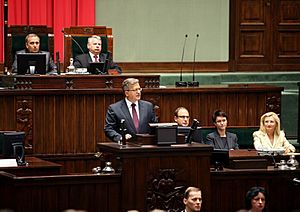
After becoming president, Komorowski made several important appointments to fill positions left vacant by the plane crash. He appointed Jacek Michałowski as the chief of the President's Chancellery and Stanisław Koziej as the head of the National Security Bureau.
On 29 April 2010, Komorowski signed a law that changed the Institute of National Remembrance. He also nominated Marek Belka to be the president of the National Bank of Poland.
After his election, Komorowski resigned from the Sejm on 8 July 2010. This meant he stopped being the Marshal and acting president. His successor as acting president was Grzegorz Schetyna, who held the position until Komorowski's official inauguration. Komorowski chose to live and work in the Belweder Palace instead of the Presidential Palace.
On 25 May 2015, after losing the 2015 presidential election to Andrzej Duda, Komorowski accepted his defeat. His term as president ended on 6 August 2015, when Andrzej Duda was sworn in.
Views on Ukraine
Komorowski showed support for Ukraine during his presidency. On 22 February 2015, he supported the idea of a UN peacekeeping mission in Donbas, a region in Ukraine.
On 9 April 2015, during a visit to Kyiv, he gave a speech to the Ukrainian parliament. He said that Europe would not be stable if Ukraine was not part of it, and that it was clear Russian troops were present in Donbas. Many politicians in Ukraine and Poland called this speech historic.
On 2 July 2015, he visited Lviv, Ukraine, and received an honorary doctorate from Lviv University. He announced that he would create his own institute to focus on Polish-Ukrainian relations.
Personal Life
Komorowski married Anna Dembowska in 1977. They have five children: Zofia Aleksandra, Tadeusz Jan, Maria Anna, Piotr Zygmunt, and Elżbieta Jadwiga.
He is proud of his family's Lithuanian heritage and often spoke about it. In 2015, when he was made an honorary citizen of Rokiškis, Lithuania, he said that half of his heart was Lithuanian and that the land was very special to him. He mentioned that his children also feel a connection to Lithuania. Komorowski hopes that his family's heritage will continue to be important and help with cooperation between Lithuanians and Poles.
In 2015, a university department called the Bronisław Komorowski Centre for Political Practice was created at Collegium Civitas in Warsaw. Komorowski gives lectures there, especially to students studying Journalism and New Media.
Honours and Awards
National Honours
 Poland:
Poland:
- Knight of the Order of the White Eagle (This is given to presidents automatically)
- Grand Cross of the Order of Polonia Restituta (Also given to presidents automatically)
Foreign Honours
Komorowski received many awards from other countries, showing his importance on the international stage. Some of these include:
 Croatia: Grand Order of King Tomislav (2013)
Croatia: Grand Order of King Tomislav (2013) Estonia: Collar of the Order of the Cross of Terra Mariana (2014)
Estonia: Collar of the Order of the Cross of Terra Mariana (2014) France: Grand Cross of the National Order of the Legion of Honour (2012)
France: Grand Cross of the National Order of the Legion of Honour (2012) Greece: Grand Cross of the Order of the Redeemer (2013)
Greece: Grand Cross of the Order of the Redeemer (2013) Italy: Knight Grand Cross with Collar of the Order of Merit of the Italian Republic (2012)
Italy: Knight Grand Cross with Collar of the Order of Merit of the Italian Republic (2012) Latvia: Commander Grand Cross with Chain of the Order of the Three Stars (2012)
Latvia: Commander Grand Cross with Chain of the Order of the Three Stars (2012) Malta: Honorary Companion of Honour of the National Order of Merit (2009)
Malta: Honorary Companion of Honour of the National Order of Merit (2009) Monaco: Knight Grand Cross of the Order of Saint Charles (2012)
Monaco: Knight Grand Cross of the Order of Saint Charles (2012) Netherlands: Knight Grand Cross of the Order of the Netherlands Lion (2014)
Netherlands: Knight Grand Cross of the Order of the Netherlands Lion (2014) North Macedonia: Order 8-September (2013)
North Macedonia: Order 8-September (2013) Norway: Grand Cross of the Order of St. Olav (2012)
Norway: Grand Cross of the Order of St. Olav (2012) Portugal: Grand Collar of the Order of Prince Henry (2012)
Portugal: Grand Collar of the Order of Prince Henry (2012) Slovakia: Grand Cross of the Order of the White Double Cross (2014)
Slovakia: Grand Cross of the Order of the White Double Cross (2014) Sweden: Knight of the Royal Order of the Seraphim (2011)
Sweden: Knight of the Royal Order of the Seraphim (2011) Ukraine: Member 1st Class of the Order of Prince Yaroslav the Wise (2008)
Ukraine: Member 1st Class of the Order of Prince Yaroslav the Wise (2008)
Special Recognitions
Images for kids
-
President Bronisław Komorowski with Barack Obama (Washington, 2010)
-
President Bronisław Komorowski with President Dmitry Medvedev (2010)
-
President Bronisław Komorowski with Angela Merkel and Nicolas Sarkozy (2011)
-
President Bronisław Komorowski with Dalia Grybauskaitė (2011)
-
President Bronisław Komorowski with Christian Wulff (2010)
-
President Bronisław Komorowski with Herman Van Rompuy (2011)
-
President Bronisław Komorowski with Victor Yanukovych (2011)
-
President Bronisław Komorowski with Mykola Azarov (2010)
-
President Bronisław Komorowski with Pope Benedict XVI (2010)
-
President Bronisław Komorowski with Abdullah Gül (2011)
-
President Bronisław Komorowski with Barack Obama (Warsaw, 2011)
-
President Bronisław Komorowski with Joachim Gauck (2012)
-
President Bronisław Komorowski with Park Geun-hye (2013)
-
President Bronisław Komorowski with Chuck Hagel (2014)
See also
 In Spanish: Bronisław Komorowski para niños
In Spanish: Bronisław Komorowski para niños
 | Kyle Baker |
 | Joseph Yoakum |
 | Laura Wheeler Waring |
 | Henry Ossawa Tanner |


